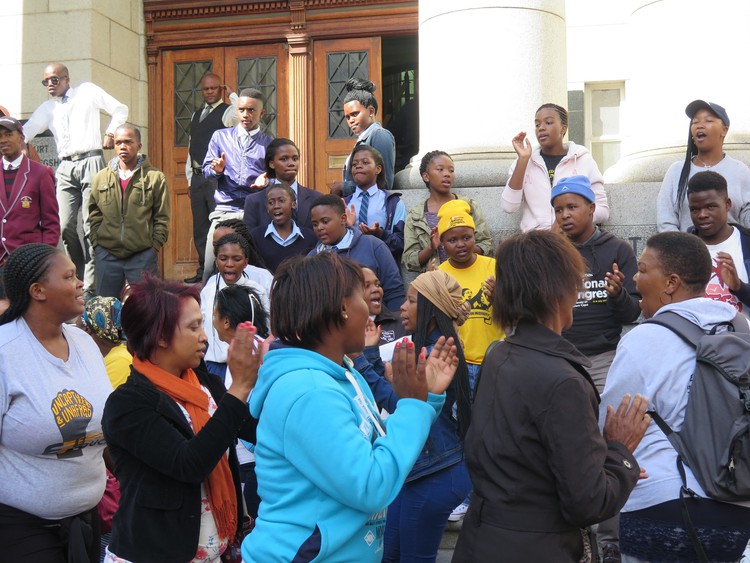
Demonstrators outside the Western Cape High Court during the Grootkraal hearings. Photo: Ashleigh Furlong
4 May 2017
“What will they use the land for?” asked the lawyer representing the owners of the land from which the Grootkraal Primary School faces eviction. Seated in the public gallery in court, I was tempted to shout: “It’s none of your damn business! Give the community of Grootkraal their land back for the education of their children!” Of course I couldn’t do this, because Judge Elizabeth Baartman would have thrown me out, or worse, held me in contempt of court.
The Grootkraal community near Oudtshoorn, and the owners, the Kobot Besigheid Trust, faced off in the Western Cape High Court in April over the fate of the historic rural school and the land on which it stands. The Trust wants to evict the school to make way for a tourist attraction. Equal Education made submissions as a friend of the court.
Counsel for the MEC for Education in the Western Cape (Debbie Schafer) also made submissions. The Department is not opposing the application for eviction and if the eviction is granted, the school will be moved 17km away to Oudtshoorn.
Judge Baartman was at pains to point out that the Department during this land dispute has treated children of farmworkers in Grootkraal with disdain and disrespect.
This is true and I can vouch for it. The DA government’s actions in this case show why many people believe it does not care for the interests of poor black and coloured working-class people. The case has highlighted that, not unlike the current ANC government, the DA government too has no interest in dealing with the ever-emotive issue of the land; in fact the MEC for Education proclaims that she is under no obligation to consider expropriation of land. Even though the South African Schools Act gives her the powers to do so “if it is in the public interest or … for any purpose relating to school education in a province”.
In the euphoria of the first years after 1994, the newly-elected government brought together some of the best minds in the country to form a committee to prepare a more equitable and just public education system in South Africa. Transforming the invidious position of farm schools formed part of that agenda. Alive to the history of these schools as a tool for extracting labour from black rural children and a symbol of Bantu Education at its very worst, the committee recommended expropriation as a first step to improvement. Fast-forward 20 years later and the future of these schools still hangs in the balance.
Equal Education has drawn Judge Baartman’s attention to this context and argued that the MEC should consider expropriating the land in the best interest of the Grootkraal learners. The land has been in use by the community for 185 years and during this time a primary school came into existence. Surely any government voted in by the will of the people would want to protect children, especially when it comes to education?
Yet the Western Cape government is not willing to do so. Instead it keeps many poor working-class people in the dark. Visit any school built on private property in the Winelands - you will see what I am talking about. Children born of farmworkers are being taken to run-down schools, and in reality are being prepared to become low-paid farmworkers like their parents and the generations before them. The cycle of poverty is in full swing in the Western Cape Winelands under the watchful eye and couldn’t-care-less attitude of the Western Cape government.
To rub salt into a wound inflicted by colonial domination and oppression, the MEC for Education has not been to the Grootkraal school. Yet her court papers label learners’ sentiments about their school as without merit and ill-informed. During court proceedings and while the Judge was being critical of her decisions in protecting the learners, the MEC took to twitter to say that the issue pre-dated her time as MEC for Education. This does not make sense: she and previous MEC Donald Grant are both members of the DA.
On 10 May 2017 Judge Baartman will conduct an inspection to see for herself the conditions at he school. This visit by the Judge is interesting because the MEC for Education in the Western Cape has never met the community of Grootkraal in all her years of occupying that office.
It is shocking that the MEC of Education is enabling the anti-transformative and cruel actions of private profit-driven actors and proving her loyalty to them by disrespecting the rights of learners.
The area that is under dispute in this case only makes up 0,2% of the land. This makes one wonder: if the Department and the trust are putting up such a massive fight now, what will happen when we argue that far bigger chunks of the land should given back to its rightful owners?
Views expressed are not necessarily those of GroundUp.